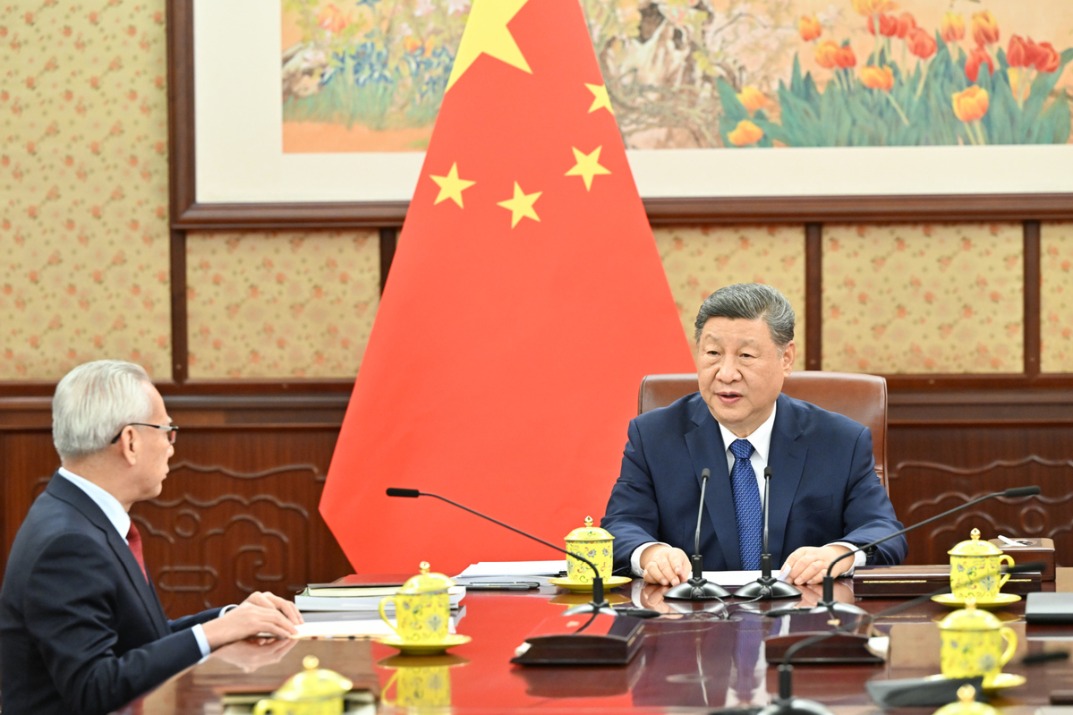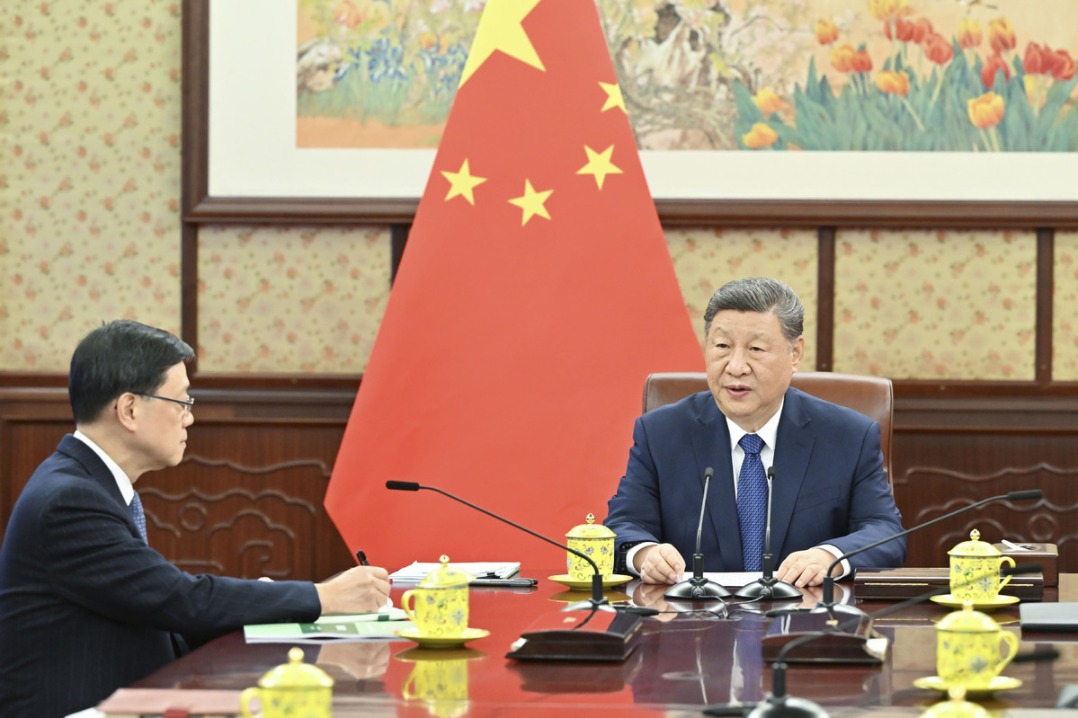Gray areas helping to get Africa out of the red

Major projects are boosting continent's income and employment, but informal sector is at the frontline of bilateral boon
Over the past decade, sub-Saharan Africa has been experiencing accelerated economic growth. Visible factors confirm this fact. They include improved economic policies, decreasing debts, diminishing poverty levels, thriving financial sectors, focused private sectors and stronger public institutions.
These, among a myriad of factors, have made the African continent, home to the highest number of developing countries, ripe for bilateral trade partnerships with developed and developing economies.
China, the second largest economy in the world, is now Africa's largest trading partner, having increased its investment twofold in the last decade to reach $200 billion in 2015. Several cooperation agreements and partnerships in various fields, such as agriculture, industrialization, education and infrastructure, have been signed between Beijing and sub-Saharan African nations.
However, little is known of China's massive role in promoting the informal sector on the continent.
The informal sector, which is used to describe a type of employment that was viewed as falling outside of the modern industrial sector, is the main source of funding for sub-Saharan Africa's burgeoning gray economy and plays a major role in fostering economic growth and job creation.

It accounts for three quarters of non-agricultural employment and 70 percent of all employment on the continent. More than 50 percent of GDP comes from this sector, while 90 percent of new job opportunities in the last decade have also emanated from this little-known sector.
As the trade imbalance between China and Africa continues to tilt in favor of China - the result of increased exports - the increasing number of African exports to China and Chinese businesses in sub-Saharan Africa, which promote the informal sector, might just be what the continent needs to tip the scales in its favor and correct the trade imbalance.
Today, more Africans are finding employment with Chinese businesses investing there. Chinese businesses, mainly in the sectors of mining, infrastructure, lumber and agriculture, are employing locals at their premises, reducing unemployment.
In the timber sector, for example, China's Shengyang Group purchased GEB, Gabon's third biggest timber firm, in 2010 from a French company. This was after Chinese businessman Zhang Guohua bought Plysorol, Europe's number one plywood manufacturer, which also owns two leading timber firms in Gabon.
The country mainly relies on the oil industry as a source of economic growth. However, the industry only accounts for 4 percent of formal employment. This is where the importance of lumber comes into play, as it provides more than 80 percent of jobs in the informal sector.
In the infrastructure sector, more Chinese companies are engaged in rail, highways, airports, seaport and housing projects than from any other country. Infrastructure investments are providing an immediate solution to the unemployment crisis experienced in most developing African countries.
It is therefore imperative that, as African nations continue to invest heavily in infrastructure through partnerships with China, more jobs are being created for both skilled and unskilled young people and for women.
Most infrastructure projects in sub-Saharan Africa being undertaken by Chinese companies are financed by the government in Beijing through loans and grants.
The largest-ever contract awarded to a Chinese company in Africa was for the construction of the coastal railway, which is approximately 1,402 km long and will link Lagos, the economic capital of Nigeria, with Calabar in the east while connecting the oil-rich states in the Niger Delta. The project is worth $12 billion and will provide many Nigerians with jobs as the railway snakes through 10 states.
Another major project being undertaken by a Chinese company and contributing immensely to job creation in the informal sector is the Bagamoyo port in Tanzania, worth $7 billion.
Other major projects in Africa being undertaken by Chinese companies include the Modderfontein New City Project in South Africa ($7 billion), the Standard Gauge Railway project in Kenya ($3.8 billion), the Infrastructure for Mines barter deal in the Democratic Republic of Congo ($6 billion) and the Chad-Sudan railway, worth $5.6 billion. These projects are expected to spur economic growth in African countries and create millions of jobs.
Chinese businesses in sub-Saharan Africa are increasing by the day, as well as expanding in their trade operations with the continent. African businesses in China are also flourishing, a testament to the fact that the informal sector is growing both in width and depth.
China Southern Airlines' move this year to increase the number of flights between Nairobi and Guangzhou underlines the fact that there is increasing informal business between China and Africa, as Nairobi serves as the continent's economic and transport hub.
The Sino-Africa formal business sector obviously accounts for more bilateral trade in terms of the amount of money that changes hands, especially after the establishment of the Forum on China-Africa Cooperation.
Since then, China has signed bilateral investment protection treaties with more than 40 African countries, as well as established centers for the promotion of Chinese investment and trade in several countries. Last year President Xi Jinping announced "Ten Cooperation" plans between China and Africa, further signaling a new dawn for Sino-Africa relations.
Finally, the fact that China Trade Week, an annual international event that brings together small, medium and large Chinese and African businesses to a forum where partnerships are encouraged, has now been held in Africa twice in the last two years, signaling the role China is playing in fostering business partnerships as well as encouraging people-to-people exchanges, which goes to build a strong and lively informal sector in sub-Saharan Africa.
The author is a PhD student at Kenyatta University in Nairobi and a contributor to China Daily. The views do not necessarily reflect those of China Daily.
(China Daily Africa Weekly 01/20/2017 page13)
Today's Top News
- Xi hears report from Macao SAR chief executive
- Xi hears report from HKSAR chief executive
- UN envoy calls on Japan to retract Taiwan comments
- Innovation to give edge in frontier sectors
- Sanctions on Japan's former senior official announced
- Xi stresses importance of raising minors' moral standards





























